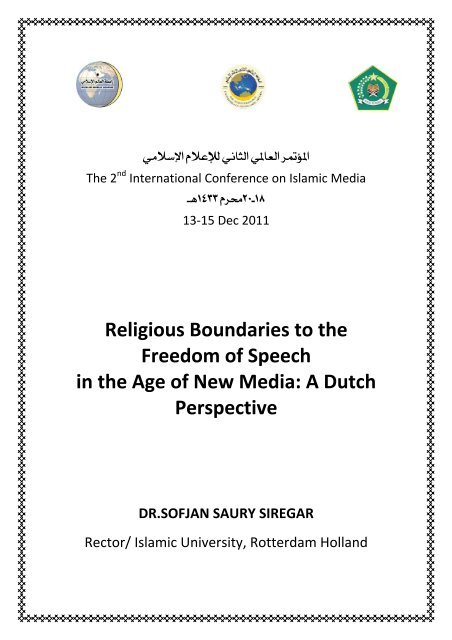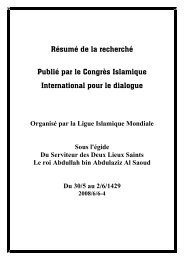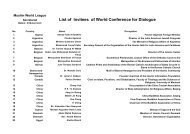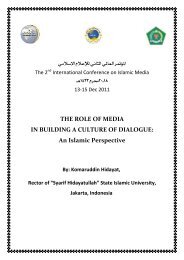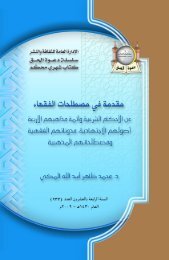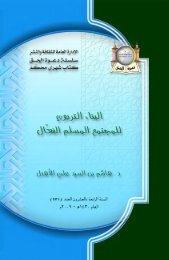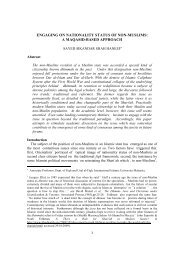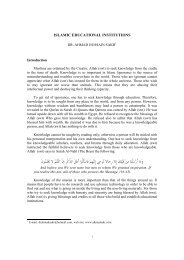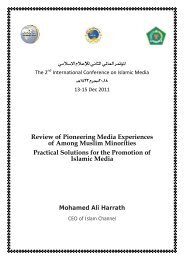Religious Boundaries to the Freedom of Speech in the Age of New ...
Religious Boundaries to the Freedom of Speech in the Age of New ...
Religious Boundaries to the Freedom of Speech in the Age of New ...
You also want an ePaper? Increase the reach of your titles
YUMPU automatically turns print PDFs into web optimized ePapers that Google loves.
<strong>Religious</strong> <strong>Boundaries</strong> <strong>to</strong> <strong>the</strong> <strong>Freedom</strong> <strong>of</strong> <strong>Speech</strong><br />
<strong>in</strong> <strong>the</strong> <strong>Age</strong> <strong>of</strong> <strong>New</strong> Media: A Dutch Perspective 1<br />
Abstract 2<br />
The idea <strong>of</strong> freedom <strong>of</strong> speech is not alien <strong>to</strong> Islamic tradition; its need <strong>in</strong> society is supported <strong>in</strong> <strong>the</strong> Qur’an.<br />
Contrary <strong>to</strong> public sentiment, freedom <strong>of</strong> speech <strong>in</strong> <strong>the</strong> European context has been emphasized on <strong>the</strong><br />
idea that <strong>the</strong> freedom is not absolute. Although <strong>the</strong> freedom <strong>of</strong> speech <strong>of</strong>fers space <strong>to</strong> shock and disturb –<br />
<strong>in</strong> a proportionate way – it carries with it duties and responsibilities, thus it may be subject <strong>to</strong> conditions<br />
and restrictions e.g. necessary <strong>to</strong> uphold public order, safety, and <strong>to</strong> protect <strong>of</strong> <strong>the</strong> reputation and rights<br />
<strong>of</strong> o<strong>the</strong>rs. This is much aligned <strong>to</strong> <strong>the</strong> notion <strong>in</strong> Islam, that any freedom should be <strong>in</strong> observance <strong>of</strong> <strong>the</strong><br />
respect and <strong>to</strong>lerance for and dignity <strong>of</strong> o<strong>the</strong>rs.<br />
The trial <strong>of</strong> <strong>the</strong> Dutch politician Geert Wilders <strong>in</strong> 2011 and <strong>the</strong> controversy and public uproar surround<strong>in</strong>g<br />
<strong>the</strong> Danish car<strong>to</strong>ons <strong>in</strong> 2006 are two examples <strong>in</strong> which <strong>the</strong> space <strong>of</strong>fered <strong>in</strong> <strong>the</strong> European context <strong>of</strong><br />
freedom <strong>of</strong> speech were exploited. The very goal <strong>of</strong> any impos<strong>in</strong>g any `limitations’ <strong>to</strong> freedom <strong>of</strong> speech <strong>in</strong><br />
<strong>the</strong> European context – i.e. ma<strong>in</strong>ta<strong>in</strong><strong>in</strong>g public order and safety was jeopardized as <strong>the</strong> <strong>in</strong>formation<br />
surround<strong>in</strong>g both <strong>the</strong> subject <strong>of</strong> <strong>the</strong> controversies as <strong>the</strong> hypes <strong>the</strong>mselves seemed <strong>to</strong> only add fuel <strong>to</strong> <strong>the</strong><br />
fire.<br />
<strong>New</strong> Media have provided a seem<strong>in</strong>gly unlimited spectre <strong>of</strong> <strong>in</strong>formation shar<strong>in</strong>g through among o<strong>the</strong>rs<br />
<strong>in</strong>ternet, blogs, social media. However, <strong>the</strong> emergence <strong>of</strong> new types <strong>of</strong> media have <strong>in</strong>creased biased `news’<br />
greatly, as many providers <strong>of</strong> `news’ seem <strong>to</strong> enterta<strong>in</strong> <strong>the</strong> notion that <strong>the</strong> news should be consumed<br />
maximally, even if this would lead <strong>to</strong> compromis<strong>in</strong>g normal journalistic standards <strong>of</strong> objectivity, balance<br />
and accuracy.<br />
The framework <strong>of</strong> Dutch law <strong>in</strong> regard <strong>to</strong> <strong>the</strong> freedom <strong>of</strong> speech on one hand, and <strong>the</strong> role <strong>of</strong> <strong>New</strong> Media<br />
on <strong>the</strong> o<strong>the</strong>r hand has led <strong>to</strong> exacerbation <strong>of</strong> <strong>the</strong> tensions surround<strong>in</strong>g issues related <strong>to</strong> Islam and Muslims.<br />
The ethics <strong>of</strong> a debate and law are not complementary <strong>in</strong> <strong>the</strong> case <strong>of</strong> <strong>the</strong> freedom <strong>of</strong> religion vis à vis <strong>the</strong><br />
freedom <strong>of</strong> speech. By not acknowledg<strong>in</strong>g that freedom <strong>of</strong> speech and freedom <strong>of</strong> religion <strong>in</strong> a democracy –<br />
as any degree <strong>of</strong> freedom - are attached <strong>to</strong> responsibilities on part <strong>of</strong> all <strong>in</strong>volved, as well as <strong>to</strong> norms <strong>of</strong><br />
ethics and <strong>of</strong> propriety, <strong>the</strong> two freedoms unnecessarily are placed diametrically opposed <strong>to</strong> each o<strong>the</strong>r.<br />
Keywords: freedom, speech, religion, Islam, Dutch, law, Europe, boundaries,<br />
democracy.<br />
Introduction<br />
Do not <strong>in</strong>sult <strong>the</strong> idols <strong>of</strong> o<strong>the</strong>r people because <strong>the</strong>y will <strong>in</strong>sult Allah.....(Koran 6:108)<br />
A Right isn’t always Right<br />
Muslims <strong>in</strong> Europe <strong>in</strong> general, but <strong>in</strong> <strong>the</strong> Ne<strong>the</strong>rlands <strong>in</strong> particular experience <strong>the</strong> constant criticism<br />
on Islam as <strong>of</strong>fensive. Over <strong>the</strong> last ten years, <strong>the</strong>y have had <strong>to</strong> endure a barrage <strong>of</strong> <strong>in</strong>sults, rang<strong>in</strong>g<br />
from call<strong>in</strong>g Islam backward <strong>to</strong> compar<strong>in</strong>g <strong>the</strong> Qur’an <strong>to</strong> Hitler’s Me<strong>in</strong> Kampf and from claims that all<br />
1 S<strong>of</strong>jan S. Siregar, President <strong>of</strong> <strong>the</strong> Islamic University <strong>of</strong> Europe, Rotterdam <strong>the</strong> Ne<strong>the</strong>rlands,<br />
s<strong>of</strong>jansir@mail.com<br />
2 Presented at <strong>the</strong> 2nd International Conference on Islamic Media, 13 December 2011, Jakarta, Indonesia.<br />
1
Muslims are potential terrorists who are out <strong>to</strong> subdue <strong>the</strong> world <strong>to</strong> <strong>the</strong> extremely distasteful claim<br />
that <strong>the</strong> Prophet <strong>of</strong> Islam was, by modern standards, a paedophile.<br />
On <strong>the</strong> whole, Muslims <strong>in</strong> <strong>the</strong> West have rema<strong>in</strong>ed very patient through all this. By do<strong>in</strong>g so<br />
follow<strong>in</strong>g <strong>in</strong> <strong>the</strong> footsteps <strong>of</strong> <strong>the</strong> blessed Prophet <strong>of</strong> Islam, who is <strong>the</strong> best example <strong>to</strong> follow. As<br />
Allah, Glorious and Exalted is he, says <strong>in</strong> <strong>the</strong> Qur’an: “Verily, <strong>in</strong> <strong>the</strong> Messenger <strong>of</strong> God you have a<br />
good example who looks forward <strong>to</strong> God and <strong>the</strong> Last Day” (1). Even though <strong>the</strong>y were surprised <strong>to</strong><br />
f<strong>in</strong>d that <strong>the</strong>ir non-Muslim fellow citizens apparently do not realise how hurtful <strong>of</strong>fend<strong>in</strong>g and<br />
mock<strong>in</strong>g what is sacred <strong>to</strong> <strong>the</strong>m. Moreover, Muslims were very surprised <strong>to</strong> see that most <strong>of</strong> <strong>the</strong>se<br />
distasteful claims were defended <strong>in</strong> <strong>the</strong> public sphere under <strong>the</strong> banner <strong>of</strong> freedom <strong>of</strong> speech.(2)<br />
Allah prohibited <strong>the</strong> Muslim <strong>in</strong>sult<strong>in</strong>g <strong>the</strong> god <strong>of</strong> o<strong>the</strong>r religion, as He said: . “Do not <strong>in</strong>sult <strong>the</strong> idols <strong>of</strong><br />
o<strong>the</strong>r people because <strong>the</strong>y will <strong>in</strong>sult Allah ” (3).<br />
This article will expla<strong>in</strong> <strong>the</strong> framework <strong>of</strong> European and Dutch law <strong>in</strong> this regard and will show what<br />
<strong>the</strong> role <strong>of</strong> <strong>the</strong> <strong>New</strong> Media is <strong>in</strong> both giv<strong>in</strong>g a voice <strong>to</strong> <strong>the</strong> voiceless on <strong>the</strong> one hand and<br />
exacerbation <strong>of</strong> <strong>the</strong> tensions surround<strong>in</strong>g issues related <strong>to</strong> Islam and Muslims on <strong>the</strong> o<strong>the</strong>r, with<br />
special attention <strong>to</strong> onl<strong>in</strong>e journalism.<br />
<strong>Freedom</strong> <strong>of</strong> <strong>Speech</strong><br />
In <strong>the</strong> current discourse freedom <strong>of</strong> speech has become an umbrella term cited <strong>in</strong> and out <strong>of</strong> season.<br />
In order <strong>to</strong> understand <strong>the</strong> importance <strong>of</strong> this, it is good <strong>to</strong> reflect on <strong>the</strong> notion <strong>of</strong> freedom <strong>in</strong><br />
general. First it should be said that <strong>the</strong> idea <strong>of</strong> freedom <strong>of</strong> speech is not alien <strong>to</strong> <strong>the</strong> Islamic tradition,<br />
as <strong>the</strong> Qur’an is clear <strong>in</strong> what is expected <strong>of</strong> <strong>the</strong> believ<strong>in</strong>g men and women: “They all enjo<strong>in</strong> <strong>the</strong><br />
do<strong>in</strong>g <strong>of</strong> what is right and forbid <strong>the</strong> do<strong>in</strong>g <strong>of</strong> what is wrong” (4). In order <strong>to</strong> live this Qur’anic<br />
<strong>in</strong>junction one actually needs <strong>to</strong> implement <strong>the</strong> freedom <strong>of</strong> speech. The way <strong>in</strong> which freedom is<br />
used and has been <strong>in</strong>stitutionalised <strong>in</strong> <strong>the</strong> European (secular) context was heavily <strong>in</strong>fluenced by<br />
Liberal th<strong>in</strong>ker John Stuart Mill. The pivot <strong>of</strong> Mill’s body <strong>of</strong> thought is <strong>the</strong> idea that one should be<br />
able <strong>to</strong> live <strong>the</strong>ir life without <strong>in</strong>terference <strong>of</strong> o<strong>the</strong>rs. Criticaster have dismissed this idea somewhat<br />
due <strong>to</strong> <strong>the</strong> fact that people are shaped by <strong>the</strong>ir surround<strong>in</strong>gs and that for example family,<br />
<strong>in</strong>stitutions and governments help form <strong>in</strong>dividual choices, and that freedom can never be absolute.<br />
Never<strong>the</strong>less, <strong>the</strong> <strong>in</strong>dividual European citizen is <strong>the</strong> start<strong>in</strong>g-po<strong>in</strong>t <strong>of</strong> <strong>the</strong> European law.<br />
So what does <strong>the</strong> freedom <strong>of</strong> speech mean with<strong>in</strong> <strong>the</strong> European context and how does it relate <strong>to</strong><br />
freedom <strong>of</strong> religion In <strong>the</strong> European Convention <strong>of</strong> Human Rights a number <strong>of</strong> relevant issues have<br />
been recorded:<br />
1) <strong>Freedom</strong> <strong>of</strong> religion<br />
2
2) A prohibition <strong>of</strong> discrim<strong>in</strong>ation on <strong>the</strong> grounds <strong>of</strong> race, sex and religion<br />
3) <strong>Freedom</strong> <strong>of</strong> speech<br />
The European bill has a secular character, which means that <strong>the</strong>re is a clear separation <strong>of</strong> church and<br />
state. At a state level with<strong>in</strong> Europe <strong>the</strong>re are many differences among member states regard<strong>in</strong>g this<br />
character, which can be expla<strong>in</strong>ed on his<strong>to</strong>rical grounds. Even though every country is free <strong>to</strong><br />
<strong>in</strong>terpret <strong>the</strong> relationship between church and state <strong>in</strong> <strong>the</strong>ir own right, <strong>the</strong> way <strong>in</strong> which Europe has<br />
shaped this relationship is more dom<strong>in</strong>ant, for a sentence by <strong>the</strong> European Court <strong>of</strong> Justice is<br />
b<strong>in</strong>d<strong>in</strong>g.(5)<br />
In fact, <strong>the</strong> freedom <strong>of</strong> conscience and religion are <strong>of</strong> fundamental importance <strong>in</strong> this respect<br />
because <strong>the</strong>y are seen as <strong>the</strong> basis <strong>of</strong> democracy, and this goes for both religious and a-religious<br />
citizens. The European Court <strong>of</strong> Human Rights does not force member states <strong>to</strong> follow a set model,<br />
but places boundaries when tension arises between religious space and o<strong>the</strong>r norms and values.<br />
Moreover, a delicate issue is <strong>the</strong> relationship between freedom <strong>of</strong> speech and freedom <strong>of</strong> religion.<br />
Or <strong>to</strong> be more precise, <strong>the</strong> protection <strong>of</strong> religious feel<strong>in</strong>gs at <strong>the</strong> expense <strong>of</strong> <strong>the</strong> freedom <strong>of</strong> speech.<br />
In <strong>the</strong> case <strong>of</strong> <strong>the</strong> Danish car<strong>to</strong>on controversy (which will be discussed <strong>in</strong> detail later) <strong>the</strong> European<br />
Court stated that <strong>the</strong> right <strong>to</strong> shock and disturb plays an <strong>in</strong>dispensible role <strong>in</strong> a democracy, and is<br />
thus (with<strong>in</strong> limits) allowed.<br />
In practice, this above mentioned right is not as clear cut as it was made out <strong>to</strong> be <strong>in</strong> <strong>the</strong> case <strong>of</strong> <strong>the</strong><br />
car<strong>to</strong>ons. There are examples <strong>in</strong> which <strong>the</strong> Court speaks out <strong>in</strong> favour <strong>of</strong> <strong>the</strong> freedom <strong>of</strong> religion and<br />
aga<strong>in</strong>st <strong>the</strong> freedom <strong>of</strong> speech. The case <strong>of</strong> Theresa <strong>in</strong> 1996 is an example <strong>of</strong> this. What is essential is<br />
that <strong>the</strong> Court differs between limit<strong>in</strong>g <strong>the</strong> public (political) debate on <strong>the</strong> one hand and personal<br />
op<strong>in</strong>ions <strong>in</strong> <strong>the</strong> atmosphere <strong>of</strong> morals or religion on <strong>the</strong> o<strong>the</strong>r when <strong>in</strong>sults are be<strong>in</strong>g made. In <strong>the</strong><br />
case <strong>of</strong> <strong>the</strong> latter, Europe is more likely <strong>to</strong> be a bit more restrictive <strong>to</strong>wards <strong>the</strong> <strong>of</strong>fender.<br />
It should be clear that freedom <strong>of</strong> speech, like any o<strong>the</strong>r form <strong>of</strong> freedom, is not absolute, even<br />
though politicians and <strong>the</strong> media sometimes would like us <strong>to</strong> believe this. The European Court for<br />
Human Rights has also made this very clear <strong>in</strong> <strong>the</strong>ir convention when <strong>the</strong>y state that;<br />
<strong>the</strong> exercise <strong>of</strong> <strong>the</strong>se freedoms, s<strong>in</strong>ce it carries with it duties and responsibilities, may be<br />
subject <strong>to</strong> such formalities, conditions, restrictions or penalties as are prescribed by law and<br />
are necessary <strong>in</strong> a democratic society, <strong>in</strong> <strong>the</strong> <strong>in</strong>terests <strong>of</strong> national security, terri<strong>to</strong>rial<br />
<strong>in</strong>tegrity or public safety, for <strong>the</strong> prevention <strong>of</strong> disorder or crime, for <strong>the</strong> protection <strong>of</strong> health<br />
or morals, for <strong>the</strong> protection <strong>of</strong> <strong>the</strong> reputation or rights <strong>of</strong> o<strong>the</strong>rs... (6).<br />
Tak<strong>in</strong>g article 10 <strong>of</strong> <strong>the</strong> European Convention on Human Rights <strong>in</strong><strong>to</strong> account one could argue that <strong>in</strong><br />
<strong>the</strong> current social climate <strong>in</strong> Europe where <strong>the</strong>re are tensions regard<strong>in</strong>g <strong>the</strong> position <strong>of</strong> Muslims and<br />
3
Islam <strong>in</strong> society, <strong>the</strong> EU should be a bit more reserved with <strong>the</strong> freedom <strong>of</strong> speech used <strong>to</strong> miscall<br />
religious sentiment.<br />
The fact that article 10 exists <strong>in</strong>dicates that apart from <strong>the</strong> legal perspective <strong>in</strong> regards <strong>to</strong> <strong>the</strong><br />
freedom <strong>of</strong> speech <strong>the</strong>re is also a moral perspective. Because <strong>the</strong> freedom <strong>of</strong> speech implies<br />
responsibility one should sometimes refra<strong>in</strong> from speak<strong>in</strong>g <strong>in</strong> favour <strong>of</strong> <strong>the</strong> common good.(7) The<br />
moral perspective is based on mutual respect and <strong>to</strong>lerance, two values which are crucial for a well<br />
function<strong>in</strong>g society <strong>in</strong> which people live <strong>to</strong>ge<strong>the</strong>r <strong>in</strong> mutuality but cannot be enforced by law. God<br />
commands people <strong>to</strong> be just <strong>to</strong> one ano<strong>the</strong>r, even if <strong>the</strong>y hold oppos<strong>in</strong>g views. “O you who have<br />
believed, be constantly upright for Allah, witnesses with equity, and let not antagonism <strong>of</strong> a people<br />
prevent you from be<strong>in</strong>g just. Do justice; that is nearer <strong>to</strong> piety”(8).\<br />
The Wilders Trial<br />
Be<strong>in</strong>g part <strong>of</strong> <strong>the</strong> public debate is <strong>the</strong> def<strong>in</strong><strong>in</strong>g fac<strong>to</strong>r between limit<strong>in</strong>g <strong>the</strong> freedom <strong>of</strong> speech <strong>in</strong> most<br />
cases. Dutch right w<strong>in</strong>g politician Geert Wilders, who is known for his anti Islamic viewpo<strong>in</strong>ts, seems<br />
<strong>to</strong> be very aware <strong>of</strong> his position as a politician and <strong>the</strong> (extra) freedom that provides him with. He<br />
has perfected <strong>the</strong> art <strong>of</strong> <strong>of</strong>fend<strong>in</strong>g and disturb<strong>in</strong>g fully. In recent year Wilders has created buzz<br />
worldwide via his websites, YouTube film Fitna and twitter account by claim<strong>in</strong>g that people ought <strong>to</strong><br />
speak out aga<strong>in</strong>st Islam more and <strong>in</strong>s<strong>in</strong>uated that <strong>the</strong> found<strong>in</strong>g <strong>of</strong> Eurabia would only be a matter <strong>of</strong><br />
time. Dur<strong>in</strong>g a lecture <strong>in</strong> <strong>New</strong> York last year, Wilders underl<strong>in</strong>ed <strong>the</strong> above with <strong>the</strong> follow<strong>in</strong>g<br />
statement: “Today, I come before you <strong>to</strong> warn <strong>of</strong> a great threat. It is called Islam. It poses as a<br />
religion, but its goals are very worldly: world dom<strong>in</strong>ation, holy war, Sharia law, <strong>the</strong> end <strong>of</strong> <strong>the</strong><br />
separation <strong>of</strong> church and state, slavery <strong>of</strong> women, <strong>the</strong> end <strong>of</strong> democracy. It is NOT a religion, it is a<br />
political ideology. It demands your respect, but has no respect for you.” The technique Wilders uses<br />
is as clever as unfair; he avoids <strong>the</strong> live debate with people who have studied Islam and <strong>the</strong> lay<br />
Muslims. All he does is drop bombs <strong>in</strong> parliament and onl<strong>in</strong>e which have a shield<strong>in</strong>g effect for him<br />
and never fully expla<strong>in</strong>s himself <strong>in</strong> current affairs programmes. In a recent court case Wilders was<br />
acquitted <strong>of</strong> hate monger<strong>in</strong>g and <strong>in</strong>sult<strong>in</strong>g Muslims. The clash between <strong>the</strong> right <strong>to</strong> pr<strong>of</strong>ess one’s<br />
op<strong>in</strong>ion and <strong>the</strong> prohibition <strong>of</strong> discrim<strong>in</strong>ation on religious grounds was won by <strong>the</strong> former <strong>in</strong> this<br />
<strong>in</strong>stance. Criticis<strong>in</strong>g Islam, or any o<strong>the</strong>r religion for that matter, is acceptable as long as one does not<br />
directly and explicitly <strong>in</strong>sult Muslims <strong>the</strong> judges stated.<br />
The right <strong>to</strong> <strong>of</strong>fend accord<strong>in</strong>g <strong>to</strong> Dutch Law<br />
4
In Dutch law, as stated above <strong>in</strong> <strong>the</strong> Wilders court case, <strong>in</strong>sult<strong>in</strong>g a religion or <strong>in</strong>sult<strong>in</strong>g a religious<br />
community are two different th<strong>in</strong>gs. When <strong>in</strong>sult<strong>in</strong>g a religion, <strong>the</strong> <strong>in</strong>tention <strong>of</strong> <strong>the</strong> person who<br />
<strong>in</strong>sults is <strong>the</strong> determ<strong>in</strong><strong>in</strong>g fac<strong>to</strong>r whe<strong>the</strong>r somebody is guilty or not (9)<br />
However, when <strong>in</strong>sult<strong>in</strong>g a religious community, <strong>the</strong> <strong>in</strong>tention <strong>of</strong> <strong>the</strong> <strong>in</strong>sulter is no longer relevant<br />
but <strong>the</strong> harshness <strong>of</strong> <strong>the</strong> <strong>in</strong>sult (10)<br />
In addition <strong>to</strong> this, <strong>the</strong>re are o<strong>the</strong>r fac<strong>to</strong>rs which can make sure that <strong>in</strong>sult charges may be dismissed.<br />
The most important three fac<strong>to</strong>rs are artistic expression, religious motivation for <strong>in</strong>sult and a<br />
contribution <strong>to</strong> <strong>the</strong> public debate.<br />
If <strong>the</strong> Danish car<strong>to</strong>ons had been Dutch car<strong>to</strong>ons <strong>the</strong>y would not have been forbidden ei<strong>the</strong>r under<br />
Dutch Law. Car<strong>to</strong>ons fall under <strong>the</strong> category <strong>of</strong> satire, and satire is part <strong>of</strong> artistic expression. As long<br />
as <strong>the</strong> car<strong>to</strong>ons were made without <strong>the</strong> <strong>in</strong>tention <strong>of</strong> <strong>in</strong>sult<strong>in</strong>g someone, this would be acceptable<br />
from a law perspective. Satire is part and parcel <strong>of</strong> <strong>the</strong> Dutch cultural landscape and <strong>the</strong>refore<br />
acceptable. The same goes for <strong>in</strong>sult com<strong>in</strong>g forth from religious texts. One might take <strong>of</strong>fence <strong>to</strong><br />
certa<strong>in</strong> statements <strong>in</strong> religious texts, <strong>the</strong>y will however never be forbidden as this would go aga<strong>in</strong>st<br />
<strong>the</strong> freedom <strong>of</strong> religion people have. never<strong>the</strong>less, if a person cites religious texts <strong>in</strong> such a way that<br />
<strong>the</strong>y become unnecessarily hurtful <strong>the</strong>y would break Dutch law. The third, contribut<strong>in</strong>g <strong>to</strong> <strong>the</strong> public<br />
debate, is a controversial one for it has <strong>to</strong> do with word use, and also how <strong>of</strong>ten <strong>the</strong> <strong>of</strong>fensive words<br />
were used. (11)<br />
The case <strong>of</strong> Hirsi Ali, who claimed <strong>to</strong> fight for Muslim women’s rights, is an <strong>in</strong>terest<strong>in</strong>g one <strong>in</strong> this<br />
respect; for she called <strong>the</strong> Prophet <strong>of</strong> Islam perverted and a paedophile <strong>in</strong> order <strong>to</strong> streng<strong>the</strong>n her<br />
cause <strong>of</strong> liberat<strong>in</strong>g Muslim women. The judge ruled that even though Hirsi Ali had <strong>in</strong>sulted <strong>the</strong><br />
Muslim pla<strong>in</strong>tiff because <strong>of</strong> her words, <strong>the</strong> number <strong>of</strong> times which she had said it kept it with<strong>in</strong><br />
proportions accord<strong>in</strong>g <strong>to</strong> Dutch law.(12)<br />
Now that <strong>the</strong> legal framework is expla<strong>in</strong>ed, religious boundaries <strong>to</strong> <strong>the</strong> freedom <strong>of</strong> speech will be<br />
l<strong>in</strong>ked <strong>to</strong> <strong>the</strong> changed media landscape and onl<strong>in</strong>e journalism.<br />
<strong>New</strong> Media, <strong>New</strong> Journalism<br />
Internet is part <strong>of</strong> daily life for many people nowadays. A stagger<strong>in</strong>g one billion people have access<br />
<strong>to</strong> <strong>the</strong> <strong>in</strong>ternet <strong>to</strong>day, and <strong>the</strong> number is expected <strong>to</strong> grow rapidly. What started as a medium for<br />
search<strong>in</strong>g for <strong>in</strong>formation 15 years ago, is now an <strong>in</strong>fluential medium through which people stay <strong>in</strong><br />
<strong>to</strong>uch with friends, do bus<strong>in</strong>ess, take <strong>in</strong> news and blog.<br />
Of course, this easy access and <strong>the</strong> adjunct use <strong>of</strong> <strong>the</strong> world wide web had and still has a pr<strong>of</strong>ound<br />
<strong>in</strong>fluence <strong>in</strong> how humans take <strong>in</strong> <strong>in</strong>formation. A whole generation is com<strong>in</strong>g <strong>to</strong> age that does not<br />
know what it means <strong>to</strong> live without <strong>in</strong>ternet and be<strong>in</strong>g <strong>of</strong>fl<strong>in</strong>e. This mediasavvy generation knows<br />
5
what is out <strong>the</strong>re and can deal with <strong>in</strong>formation from different platforms all at <strong>the</strong> same time. This<br />
Generation is also referred <strong>to</strong> as be<strong>in</strong>g Generation-C, because consum<strong>in</strong>g media equals produc<strong>in</strong>g<br />
content <strong>to</strong> <strong>the</strong>m: SMS, MMS, email, chat, blog posts, podcasts, just sitt<strong>in</strong>g still and watch<strong>in</strong>g,<br />
listen<strong>in</strong>g or read<strong>in</strong>g is <strong>the</strong> exception, while collat<strong>in</strong>g, select<strong>in</strong>g and forward<strong>in</strong>g seems <strong>to</strong> be <strong>the</strong> rule.<br />
This generation <strong>in</strong>forms itself mostly through <strong>in</strong>ternet by surf<strong>in</strong>g <strong>to</strong> news websites, read<strong>in</strong>g blog<br />
entries about certa<strong>in</strong> <strong>to</strong>pics and are kept up <strong>to</strong> date by onl<strong>in</strong>e friends liv<strong>in</strong>g all over <strong>the</strong> world.<br />
This new way <strong>of</strong> us<strong>in</strong>g media has led <strong>to</strong> a clash between what we would call old and new media. Old<br />
media, such as radio, TV and pr<strong>in</strong>t media are f<strong>in</strong>d<strong>in</strong>g it <strong>to</strong>ugher and <strong>to</strong>ugher <strong>to</strong> compete with new<br />
media outlets such as <strong>in</strong>ternet, social media and smart phone applications. In 2008 a survey showed<br />
that more Europeans and North-Americans got <strong>the</strong>ir national and <strong>in</strong>ternational news onl<strong>in</strong>e ra<strong>the</strong>r<br />
than from a newspaper. It will not come as a surprise that pr<strong>in</strong>t media suffered <strong>the</strong> heaviest blows<br />
<strong>in</strong> this chang<strong>in</strong>g media landscape. The amount <strong>of</strong> newspapers have dropped tremendously over <strong>the</strong><br />
last 10 years as have <strong>the</strong> number <strong>of</strong> different magaz<strong>in</strong>es.(13)<br />
Old media companies which survive, do so because <strong>the</strong>y have changed <strong>the</strong> way <strong>in</strong> which <strong>the</strong>y<br />
provide <strong>the</strong>ir services, becom<strong>in</strong>g (at least partially) part <strong>of</strong> <strong>the</strong> new media. Both Time Magaz<strong>in</strong>e and<br />
<strong>the</strong> Economist are good examples <strong>of</strong> how established media companies anticipate on <strong>the</strong> consumer<br />
change <strong>in</strong> us<strong>in</strong>g media: heritage brands which have successfully transformed itself from be<strong>in</strong>g a<br />
current affairs magaz<strong>in</strong>e <strong>to</strong> a cross medial platform conta<strong>in</strong><strong>in</strong>g articles, videos, audio clips, pho<strong>to</strong><br />
essays blogs and polls, all <strong>of</strong>fered on different platforms and are flourish<strong>in</strong>g because <strong>of</strong> it.<br />
A change <strong>in</strong> use <strong>of</strong> media <strong>in</strong>evitably means a change <strong>in</strong> journalism. Internet has opened many doors<br />
for what Richard Nixon once called <strong>the</strong> silent majority. The web has become a platform on which<br />
everybody can give <strong>the</strong>ir two cents on any issue and run <strong>the</strong> risk <strong>of</strong> be<strong>in</strong>g taken seriously. Wikipedia<br />
is a good example <strong>of</strong> an encyclopaedia which is taken very seriously by <strong>the</strong> public, while it is <strong>in</strong> fact<br />
made by <strong>the</strong> same people who use it. When it comes <strong>to</strong> onl<strong>in</strong>e journalism three ma<strong>in</strong> observations<br />
can be made:<br />
1) The 24/7 need for news has led <strong>to</strong> a decrease <strong>in</strong> accurate report<strong>in</strong>g.<br />
2) Everybody is a journalist onl<strong>in</strong>e, but required journalistic standards are <strong>of</strong>ten not met.<br />
3) Web 2.0 has brought <strong>the</strong> journalist and his readership much closer <strong>to</strong>ge<strong>the</strong>r which raises<br />
concerns about <strong>the</strong> ‘pleas<strong>in</strong>g fac<strong>to</strong>r’ <strong>of</strong> journalists.<br />
Accuracy and <strong>the</strong> 24-hour news cycle<br />
The first 24-hour news cycle arrived with <strong>the</strong> advent <strong>of</strong> news channels on TV. The channels brought a<br />
much faster pace <strong>of</strong> news production with <strong>in</strong>creased demand for s<strong>to</strong>ries that can be presented as<br />
6
news because <strong>of</strong> <strong>the</strong> fact that <strong>the</strong>y are cont<strong>in</strong>uously ‘on air’. This pace only <strong>in</strong>creased with <strong>the</strong> rise <strong>of</strong><br />
onl<strong>in</strong>e news. It is always prime time somewhere <strong>in</strong> <strong>the</strong> world.<br />
The pressure <strong>of</strong> both commercial stakes and need<strong>in</strong>g scoops constantly because it is always prime<br />
time creates immense competition between different media organisations. This competition has led<br />
<strong>to</strong> a movement away from traditional values such as verification, expla<strong>in</strong><strong>in</strong>g context, relevance and<br />
proportion. Former journalist Tom Rosentiel fears that “<strong>the</strong>se values will be replaced by a<br />
"journalism <strong>of</strong> assertion" which de-emphasizes whe<strong>the</strong>r a claim is valid and encourages putt<strong>in</strong>g a<br />
claim <strong>in</strong><strong>to</strong> <strong>the</strong> arena <strong>of</strong> public discussion as quickly as possible”.<br />
In a survey among Dutch journalists more than one third asserted that <strong>the</strong>y fear that <strong>the</strong> credibility<br />
<strong>of</strong> journalism <strong>in</strong> general is <strong>in</strong> danger because <strong>of</strong> this. In addition <strong>to</strong> this a stagger<strong>in</strong>g 60% does not<br />
regularly verify <strong>in</strong>formation found on <strong>the</strong> <strong>in</strong>ternet through ano<strong>the</strong>r source.(14)<br />
When look<strong>in</strong>g at <strong>the</strong> way <strong>in</strong> which Islam and Muslims are be<strong>in</strong>g portrayed <strong>in</strong> Western media, it is<br />
clear that <strong>the</strong>y are discussed from an Outsider’s view, which means that news regard<strong>in</strong>g Muslims<br />
and Islam is not contextualised <strong>in</strong> a way Muslims <strong>the</strong>mselves would. For <strong>in</strong>stance <strong>the</strong> attacks <strong>of</strong><br />
September 11 were expla<strong>in</strong>ed <strong>in</strong> Western media <strong>in</strong> terms <strong>of</strong> ‘A holy war aga<strong>in</strong>st <strong>the</strong> West’, and that<br />
<strong>the</strong> perpetra<strong>to</strong>rs were driven solely by a desire <strong>to</strong> become martyrs. The political reality <strong>of</strong> <strong>the</strong> people<br />
and countries <strong>in</strong>volved was completely neglected. Many news commenta<strong>to</strong>rs also simply assumed<br />
that this was an act <strong>of</strong> Muslims hat<strong>in</strong>g <strong>the</strong> West because <strong>of</strong> its lewd morals <strong>in</strong> <strong>the</strong> West and did not<br />
take <strong>in</strong><strong>to</strong> account US foreign policy <strong>in</strong> this regard. In some cases it was an attack <strong>of</strong> Islam aimed at<br />
<strong>the</strong> West.<br />
By equat<strong>in</strong>g Islam and terrorism, journalists reduced Islam <strong>to</strong> a political ideology <strong>in</strong>stead <strong>of</strong> view<strong>in</strong>g it<br />
as a dynamic religion, which has led <strong>to</strong> many problems <strong>in</strong> Europe.<br />
Ultimately, society as a whole will pay <strong>the</strong> price for <strong>the</strong> unfair and daily bombardment <strong>of</strong> negative<br />
news surround<strong>in</strong>g Muslims as it will become more polarised. Abrahamian (2003) states that aer<br />
9/11 <strong>the</strong> was an <strong>in</strong>crease <strong>in</strong> verbal and physical violence <strong>to</strong>wards Muslims, and The European<br />
Moni<strong>to</strong>r<strong>in</strong>g Centre on Racism and Xenophobia stated that “...relatively low levels <strong>of</strong> physical violence<br />
were identified <strong>in</strong> most countries, although verbal abuse, harassment and aggression was much<br />
more widespread. Muslims, especially Muslim women, asylum seekers and o<strong>the</strong>rs, <strong>in</strong>clud<strong>in</strong>g those<br />
who ‘look’ <strong>of</strong> Muslim or Arab descent were at times targeted for aggression. Mosques and Islamic<br />
cultural centers were also widely targeted for damage and retalia<strong>to</strong>ry acts.” (15)<br />
This shows that accuracy <strong>of</strong> ‘facts’ and <strong>of</strong>fer<strong>in</strong>g context <strong>in</strong>stead <strong>of</strong> isolat<strong>in</strong>g <strong>in</strong>cidents are <strong>of</strong> utmost<br />
importance when try<strong>in</strong>g <strong>to</strong> fight polarisation <strong>in</strong> society based on religious differences. From a<br />
Qur’anic view God encourages people <strong>to</strong> understand each o<strong>the</strong>r <strong>in</strong> <strong>the</strong> light <strong>of</strong> pluralism and peace<br />
7
and co-existence when He says: “O humanity! Behold, we have created you all out <strong>of</strong> a male and a<br />
female, and have made you <strong>in</strong><strong>to</strong> nations and tribes, so that you will get <strong>to</strong> know each o<strong>the</strong>r” (16) .<br />
Blogs, Everybody can be a journalist<br />
With <strong>the</strong> fur<strong>the</strong>r development <strong>of</strong> <strong>the</strong> new media a new brand <strong>of</strong> journalism has emerged: Blogs.<br />
They are op<strong>in</strong>ionated, rant<strong>in</strong>g, <strong>of</strong>ten <strong>in</strong>coherent and frequently biased with little regard for accuracy<br />
or balance. A blog is simply a highly personalised series <strong>of</strong> updated posts on a web page <strong>in</strong> <strong>the</strong> form<br />
<strong>of</strong> a diary or journal, <strong>of</strong>ten <strong>in</strong>clud<strong>in</strong>g commentary on, and hypertext l<strong>in</strong>ks <strong>to</strong>, o<strong>the</strong>r web sites.<br />
Perhaps one attraction <strong>of</strong> blogg<strong>in</strong>g lies precisely <strong>in</strong> its unmediated and dynamic quality."Readers are<br />
flock<strong>in</strong>g <strong>to</strong> onl<strong>in</strong>e news sites by <strong>the</strong> millions for <strong>the</strong> latest news,” JD Lasica, senior edi<strong>to</strong>r <strong>of</strong> <strong>the</strong><br />
Onl<strong>in</strong>e Journalism Review states."[The Public is] also stream<strong>in</strong>g <strong>to</strong> weblogs for sceptical analysis,<br />
critical commentary, alternative perspectives rarely seen <strong>in</strong> ma<strong>in</strong>stream media. Unlike <strong>the</strong> large<br />
media organisations, bloggers were unh<strong>in</strong>dered by <strong>the</strong> normal journalistic standards <strong>of</strong> objectivity,<br />
balance and accuracy. This amateur output was raw, subjective and honest as people sought<br />
emotions, not detachment - f<strong>in</strong>d<strong>in</strong>g solace and expression <strong>in</strong> <strong>the</strong> words <strong>of</strong> <strong>the</strong> thousands <strong>of</strong> blogs<br />
that sprang up.<br />
Moreover, <strong>the</strong> fact that established pr<strong>in</strong>t journalists from outlets such as The Independent and<br />
Guardian Unlimited started <strong>to</strong> create <strong>the</strong>ir own weblogs <strong>to</strong> sit alongside news and features, blurred<br />
<strong>the</strong> dist<strong>in</strong>ction between ‘real’ journalism and blogg<strong>in</strong>g even more.<br />
The question is why so many readers <strong>of</strong> onl<strong>in</strong>e content have chosen <strong>to</strong> steer away from traditional<br />
sources <strong>of</strong> news <strong>in</strong> favour <strong>of</strong> weblogs. Look<strong>in</strong>g at <strong>the</strong> content blogs provide, such as alternative<br />
perspective, first-person experiences and <strong>in</strong>teractivity, one might conclude that readers want ei<strong>the</strong>r<br />
a balanced or more personal angle <strong>to</strong> <strong>the</strong>ir news and that standard and rigour do not necessarily<br />
matter. Modern day Western society is <strong>in</strong>dividualised <strong>to</strong> such an extent that <strong>the</strong> way <strong>in</strong> which<br />
<strong>in</strong>dividuals def<strong>in</strong>e and try <strong>to</strong> solve <strong>the</strong>ir own problems has become <strong>the</strong> lens though which <strong>the</strong> world<br />
is viewed. Blogs have become <strong>in</strong> a sense a global conversation about how <strong>the</strong> world is viewed, an<br />
<strong>in</strong>dividual network <strong>of</strong> personally tweaked news . The way <strong>in</strong> which Al Qaeda is used and uses<br />
<strong>in</strong>ternet is a good example <strong>of</strong> this collation and expression <strong>of</strong> Islamic justifications on for <strong>in</strong>stance<br />
weblogs given by people (radicals) who have not even received proper religious tra<strong>in</strong><strong>in</strong>g <strong>to</strong> do<br />
so.(17)<br />
Unfortunately, blogg<strong>in</strong>g is not <strong>the</strong> democratic <strong>in</strong>nova<strong>to</strong>r u<strong>to</strong>pians hoped it <strong>to</strong> be. But it <strong>of</strong>fered<br />
freedom. <strong>Freedom</strong> <strong>to</strong> select and create content which, most <strong>of</strong>ten, does not live up <strong>to</strong> <strong>the</strong> standard<br />
<strong>of</strong> traditional journalism as agreed on <strong>in</strong> <strong>the</strong> declaration <strong>of</strong> pr<strong>in</strong>ciples on <strong>the</strong> conduct <strong>of</strong> Journalists <strong>in</strong><br />
Bordeaux. This is someth<strong>in</strong>g we have <strong>to</strong> deal with because <strong>of</strong> <strong>the</strong> fact that news on blogs is<br />
8
au<strong>the</strong>ntic, and that, more than anyth<strong>in</strong>g else, is what <strong>to</strong>day’s <strong>in</strong>ternet generation is actually look<strong>in</strong>g<br />
for.<br />
A culture <strong>of</strong> pleas<strong>in</strong>g<br />
Accord<strong>in</strong>g <strong>to</strong> a Dutch survey amongst journalists more than 50% <strong>of</strong> <strong>the</strong>m has more contact with <strong>the</strong><br />
audience because <strong>of</strong> <strong>in</strong>ternet. In a bid <strong>to</strong> w<strong>in</strong> over readers <strong>in</strong> a very <strong>to</strong>ugh market, newspapers such<br />
as <strong>the</strong> Guardian opened up a chunk <strong>of</strong> <strong>the</strong>ir website <strong>in</strong> order for readers <strong>to</strong> comment on articles<br />
called comment is free which is more or less an open forum.(18)<br />
This talkback option has asked <strong>of</strong> <strong>the</strong> journalist <strong>to</strong> change his role and become more flexible. Before,<br />
<strong>the</strong> great wall <strong>of</strong> Ch<strong>in</strong>a divided <strong>the</strong> journalist from his readers. The Journalist never thought about<br />
‘what <strong>the</strong> public’ wanted <strong>to</strong> read, but only what he felt <strong>the</strong>y should know. This is impossible and<br />
unth<strong>in</strong>kable nowadays. A journalist must work <strong>to</strong>ge<strong>the</strong>r with <strong>the</strong> critical and sometimes stubborn<br />
citizens nowadays <strong>to</strong> spark <strong>in</strong>terest <strong>in</strong> <strong>the</strong> pieces which he writes. This means updat<strong>in</strong>g and debat<strong>in</strong>g<br />
constantly, and also look at news as a commercial venture: what does my reader want <strong>to</strong> read The<br />
danger here is that journalists will adopt <strong>the</strong> slant and public displeasure <strong>in</strong> order <strong>to</strong> be read more.<br />
The economic pressure has led <strong>to</strong> some parts <strong>of</strong> <strong>the</strong> press mov<strong>in</strong>g <strong>to</strong>ward sensationalism,<br />
enterta<strong>in</strong>ment and op<strong>in</strong>ion. Through this stereotypes have been re<strong>in</strong>forced more than broken down<br />
and has led <strong>to</strong> fur<strong>the</strong>r negative fram<strong>in</strong>g <strong>of</strong> Islam <strong>in</strong> European society. A good example <strong>of</strong> this was<br />
when a few hundred t-shirts with <strong>the</strong> face <strong>of</strong> B<strong>in</strong> Laden were sold <strong>in</strong> Indonesia. This was news on all<br />
possible news platforms available, giv<strong>in</strong>g people <strong>the</strong> impression that <strong>the</strong> whole <strong>of</strong> Indonesia was<br />
supportive <strong>of</strong> Al Qaeda, whereas obviously it was a gross misrepresentation <strong>of</strong> <strong>the</strong> facts and that this<br />
could not be fur<strong>the</strong>r away from <strong>the</strong> truth.<br />
The Qoer'an has clearly stated: O you have believed, if <strong>the</strong>re comes <strong>to</strong> you a disobedient one with<br />
<strong>in</strong>formation, <strong>in</strong>vestigate, lest you harm a people out <strong>of</strong> ignorance and become, over what you have<br />
done, regretful. (19)<br />
Tension Hype!<br />
The Danish car<strong>to</strong>on controversy is a typical example <strong>of</strong> how <strong>the</strong> tension between <strong>Freedom</strong> <strong>of</strong> religion<br />
on <strong>the</strong> one hand and freedom <strong>of</strong> speech on <strong>the</strong> o<strong>the</strong>r was portrayed on different platforms <strong>of</strong> new<br />
media, unleash<strong>in</strong>g a hype <strong>of</strong> immense proportions.<br />
On Thursday 30 September 2005 edi<strong>to</strong>r Flemm<strong>in</strong>g Rose <strong>of</strong> <strong>the</strong> conservative Danish newspaper<br />
Jyllands-Posten publishes 12 car<strong>to</strong>ons <strong>of</strong> <strong>the</strong> prophet Muhammad <strong>in</strong> <strong>the</strong> Art section <strong>of</strong> <strong>the</strong><br />
9
newspaper. In <strong>the</strong> months lead<strong>in</strong>g up <strong>to</strong> <strong>the</strong> publication <strong>the</strong> debate on censorship and self<br />
censorship heated up <strong>in</strong> Denmark. After he hears that children’s book writer Kaare Bluitgen can’t<br />
f<strong>in</strong>d an illustra<strong>to</strong>r for her book on <strong>the</strong> life <strong>of</strong> Muhammad, Rose decides <strong>to</strong> ask 25 car<strong>to</strong>onists <strong>to</strong> draw<br />
up a satirical car<strong>to</strong>on <strong>of</strong> which <strong>the</strong> Prophet <strong>of</strong> Islam is <strong>the</strong> subject. 12 people respond and <strong>the</strong>ir<br />
car<strong>to</strong>ons are published. At that po<strong>in</strong>t Rose could not have realised that his publication <strong>of</strong> satirical<br />
car<strong>to</strong>ons, would lead <strong>to</strong> riots, deaths, diplomatic rows and an economic boycott <strong>of</strong> Danish<br />
products.(20)<br />
Weeks after <strong>the</strong> publication Egyptian newspaper Al Fadjr repr<strong>in</strong>ts <strong>the</strong> car<strong>to</strong>ons <strong>in</strong> anger. Moreover,<br />
at around that same time, a group <strong>of</strong> Danish Muslims travels <strong>to</strong> <strong>the</strong> middle-east br<strong>in</strong>g<strong>in</strong>g <strong>the</strong><br />
car<strong>to</strong>ons and o<strong>the</strong>r materials <strong>the</strong>y f<strong>in</strong>d onl<strong>in</strong>e. This lobby is supported and amplified by numerous<br />
websites, blogs, emails and cha<strong>in</strong> SMSes. The anger surround<strong>in</strong>g <strong>the</strong> publication also leads <strong>to</strong> a call<br />
for boycott<strong>in</strong>g Danish products though <strong>in</strong>ternet and mobile phones.<br />
What started as an aempt <strong>to</strong> stir up a debate <strong>in</strong> Denmark <strong>in</strong> September 2005, was a full blown<br />
media hype <strong>in</strong> 2006. Boosted by <strong>the</strong> many emails, text messages, blog entries and <strong>in</strong>teractive polls<br />
on websites everybody formed an op<strong>in</strong>ion (whe<strong>the</strong>r pro or con) which was more <strong>of</strong>ten than not<br />
noth<strong>in</strong>g more than parrot<strong>in</strong>g. Facts became completely irrelevant and rumours spread so fast that<br />
<strong>the</strong>y are not checked on <strong>the</strong>ir truth. Many people protest<strong>in</strong>g had not even seen <strong>the</strong> car<strong>to</strong>ons. In<br />
protests th<strong>in</strong>gs got out <strong>of</strong> hand and people crossed boundaries set by Allah when <strong>in</strong>nocent people<br />
died and protesters burnt and trampled <strong>the</strong> flag <strong>of</strong> Denmark which has a religious symbol on it. “Do<br />
not <strong>in</strong>sult <strong>the</strong> idols <strong>of</strong> o<strong>the</strong>r people because <strong>the</strong>y will <strong>in</strong>sult Allah ” (21).<br />
The <strong>in</strong>terest<strong>in</strong>g th<strong>in</strong>g about this media hype is <strong>the</strong> fact that it is very much a new-media hype.<br />
Information was sent and received over a variety <strong>of</strong> platforms which were all connected one way or<br />
<strong>the</strong> o<strong>the</strong>r. Also, because <strong>of</strong> <strong>the</strong> nature <strong>of</strong> new-media we see cont<strong>in</strong>uous real time updates which<br />
means that it becomes <strong>in</strong>creas<strong>in</strong>gly more difficult <strong>to</strong> put out <strong>the</strong> fire as new sparks emerge from<br />
everywhere. This is a reason why <strong>the</strong> uproar was so lengthy.<br />
The car<strong>to</strong>on controversy has rem<strong>in</strong>ded us <strong>of</strong> <strong>the</strong> fact that <strong>the</strong> traditional borders <strong>of</strong> a country no<br />
longer depict <strong>the</strong> mental and moral borders <strong>of</strong> people. We are liv<strong>in</strong>g <strong>in</strong> an age where because <strong>of</strong><br />
globalisation, <strong>the</strong> 24-hour economy and <strong>in</strong>creas<strong>in</strong>g (<strong>in</strong>ternational) media literacy people are aware <strong>of</strong><br />
what is happen<strong>in</strong>g around <strong>the</strong>m and are more likely <strong>to</strong> respond <strong>to</strong> issues which are close <strong>to</strong> one’s<br />
heart.<br />
Conclusion<br />
10
The world has changed significantly over <strong>the</strong> last decade. Technological advances <strong>in</strong> <strong>the</strong> field <strong>of</strong> <strong>the</strong><br />
media have made it possible <strong>to</strong> really view <strong>the</strong> world as a global village. This global village called <strong>the</strong><br />
world wide web, like any young nation, has its issues. It has given a voice <strong>to</strong> <strong>the</strong> voiceless, which can<br />
be heard and read on millions <strong>of</strong> websites and blogs daily. One needs <strong>to</strong> shed a positive light on this<br />
and see that this means that many people can now def<strong>in</strong>e <strong>the</strong>mselves.<br />
However, <strong>the</strong> hoped for democratic revolution <strong>of</strong> Internet has not taken place. In many <strong>in</strong>stances<br />
def<strong>in</strong><strong>in</strong>g <strong>the</strong> ‘o<strong>the</strong>r’ is still prevalent and has led <strong>to</strong> social tension. Unfortunately, <strong>in</strong> a great number<br />
<strong>of</strong> <strong>in</strong>stances <strong>the</strong> voiceless have become <strong>the</strong> faceless, and it is this anonymity which has partially led<br />
<strong>to</strong> <strong>the</strong> amount <strong>of</strong> <strong>of</strong>fence at <strong>the</strong> address <strong>of</strong> religion <strong>in</strong> a rapidly secularis<strong>in</strong>g Europe.<br />
Dutch law is very clear: When it comes <strong>to</strong> tak<strong>in</strong>g <strong>of</strong>fence, one should be resilient, even when it<br />
comes <strong>to</strong> religion. The public prosecu<strong>to</strong>r has treaded lightly and has only <strong>in</strong> a rare occasion<br />
prosecuted someone for cross<strong>in</strong>g <strong>the</strong> l<strong>in</strong>e when it comes <strong>to</strong> <strong>of</strong>fend<strong>in</strong>g people regard<strong>in</strong>g <strong>the</strong>ir<br />
religious beliefs. In <strong>the</strong> recent<br />
hate monger<strong>in</strong>g case aga<strong>in</strong>st Muslims <strong>of</strong> Dutch MP Geert Wilders <strong>the</strong> public prosecu<strong>to</strong>r even<br />
demanded full acquittal.(22)<br />
Apart from <strong>the</strong> legal side <strong>of</strong> <strong>the</strong> debate regard<strong>in</strong>g religious boundaries <strong>to</strong> freedom <strong>of</strong> speech we also<br />
have moral boundaries <strong>to</strong> take <strong>in</strong><strong>to</strong> consideration which are systematically crossed <strong>in</strong> this <strong>in</strong>stance.<br />
Van S<strong>to</strong>kkum (2009) argues that <strong>the</strong> <strong>in</strong><strong>to</strong>lerance <strong>to</strong>wards Muslims <strong>in</strong> both <strong>the</strong> media and <strong>the</strong> public<br />
debate stem from radical secular concepts and that <strong>the</strong> expression <strong>of</strong> <strong>the</strong>se concepts are seen as less<br />
problematic than <strong>in</strong><strong>to</strong>lerance <strong>to</strong>wards o<strong>the</strong>r m<strong>in</strong>ority groups and religions.(23)<br />
It is very unsatisfac<strong>to</strong>ry for Muslims <strong>to</strong> ascerta<strong>in</strong> <strong>the</strong> fact that from a juridical perspective not much<br />
can be done <strong>to</strong> s<strong>to</strong>p <strong>the</strong> cont<strong>in</strong>uous flow <strong>of</strong> negativity surround<strong>in</strong>g <strong>the</strong>ir religion and Islamic Identity.<br />
It is because <strong>of</strong> this that many Muslims feel pressured by Dutch society and <strong>in</strong>sulted.<br />
However, <strong>the</strong> fact that cases aga<strong>in</strong>st Hirsi Ali (2005) and Wilders (2011) went <strong>to</strong> court gave Muslims<br />
<strong>the</strong> opportunity <strong>to</strong> clearly expound on why th<strong>in</strong>gs said <strong>in</strong> <strong>the</strong> media by both politicians and <strong>the</strong>ir<br />
adherents were perceived as be<strong>in</strong>g hurtful <strong>to</strong> <strong>the</strong> community, which provided <strong>the</strong> debate with a new<br />
angle from an ethical approach.<br />
It seems that <strong>the</strong> laws regard<strong>in</strong>g freedom <strong>of</strong> speech and religious boundaries have not taken <strong>the</strong><br />
zeitgeist <strong>of</strong> <strong>to</strong>day’s world <strong>in</strong><strong>to</strong> account properly, and are <strong>the</strong>refore sometimes seen as unjust and<br />
11
arbitrary. It is <strong>to</strong>o easy <strong>to</strong> state someth<strong>in</strong>g <strong>in</strong> a blog-post or on twitter and simply hide beh<strong>in</strong>d<br />
freedom <strong>of</strong> speech, for a debate needs <strong>to</strong> be open, respectful and honourable. Muslims are<br />
commanded <strong>to</strong> do so through <strong>the</strong> follow<strong>in</strong>g Qoer’anic <strong>in</strong>junction: “Invite <strong>to</strong> <strong>the</strong> Way <strong>of</strong> your Lord<br />
with wisdom and fair admonition; and argue with <strong>the</strong>m <strong>in</strong> ways that are best and most gracious”<br />
(24).<br />
It is precisely <strong>the</strong>se above mentioned three adjectives which are more <strong>of</strong>ten than not absent <strong>in</strong> <strong>the</strong><br />
debate on Islam <strong>in</strong> <strong>the</strong> media. Interest<strong>in</strong>gly enough European law places <strong>the</strong> right <strong>to</strong> shock, disturb<br />
and <strong>of</strong>fend over <strong>the</strong> ethical boundaries needed <strong>to</strong> engage <strong>in</strong> a debate, and by do<strong>in</strong>g this show<strong>in</strong>g<br />
that <strong>the</strong> ethics <strong>of</strong> a debate and law are not complementary <strong>in</strong> <strong>the</strong> case <strong>of</strong> <strong>the</strong> freedom <strong>of</strong> religion and<br />
<strong>the</strong> freedom <strong>of</strong> speech from a law perspective. This very <strong>in</strong>compatibility between ethics and law<br />
will lead <strong>to</strong> numerous new skirmishes on <strong>the</strong> religious boundaries <strong>of</strong> <strong>the</strong> freedom <strong>of</strong> speech.<br />
Roerdam, 2 December 2011<br />
Footnote:<br />
(1) Qoer'an 33 : 21<br />
(2) Evers, H. Media, Extremisme en de grenzen van de uit<strong>in</strong>gsvrijheid, <strong>in</strong> Media Ethiek, p. 139-<br />
152 (Gron<strong>in</strong>gen: The Ne<strong>the</strong>rlands) 2007.<br />
(3) Qoer'an 6 : 108<br />
(4) Qoer'an 9 : 71<br />
(5) European Court <strong>of</strong> Human Rights, European Convention on Human Rights,<br />
http://www.echr.coe.<strong>in</strong>t Last accessed 03/10/2011.<br />
(6) European Convention on Human Rights<br />
(7) Murdered C<strong>in</strong>easte Theo van Gogh’s parents stated <strong>the</strong> same th<strong>in</strong>g dur<strong>in</strong>g his funeral <strong>in</strong><br />
2004.<br />
(8) Qoer'an 5 : 8<br />
(9) Van Het Reve trial 1967<br />
(10) The Goeree family trial 1989.<br />
Hermans, L Pleijter, A Tebbe, F. Nieuwe journalisten door nieuwe bronnen, (Rotterdam: The<br />
Ne<strong>the</strong>rlands) 2002.<br />
(11) Shadid, W. Moslims <strong>in</strong> de Media: De My<strong>the</strong> van de registrerende journalistiek, <strong>in</strong> Mist <strong>in</strong> de<br />
Polder (ed: Vellenga, S et al) p.173-193 (Amsterdam:The Ne<strong>the</strong>rlands) 2009.<br />
12
(12) Blanken, H Deuze, M. PopUp De bots<strong>in</strong>g tussen oude en nieuwe media, (Amsterdam: The<br />
Ne<strong>the</strong>rlands) 2009<br />
(13) Berger, M.S. Religieuze grenzen aan de vrijheid van men<strong>in</strong>gsuit<strong>in</strong>g: de Deense spotprenten<br />
voor de Nederlandse rechter, <strong>in</strong> NCJM-Bullet<strong>in</strong>, p. 664-675 (Leiden: The Ne<strong>the</strong>rlands) 2006.<br />
Loenen , T. Gelijkheid als juridisch beg<strong>in</strong>sel, (Amsterdam: The Ne<strong>the</strong>rlands) 2009.<br />
(14) Rechtspraak, de. Kort ged<strong>in</strong>g Hirsi Ali, Hoge Raad der Nederlanden<br />
http://www.rechtspraak.nl last accessed 03/10/2011.<br />
(15) Abrahamian, E. The US media, Hunt<strong>in</strong>g<strong>to</strong>n and September 11, <strong>in</strong> Third world Quarterly, p<br />
529-544 (London: United K<strong>in</strong>gdom) 2003.<br />
(16) Qoer'an 49 : 13<br />
(17) Thomas, T.L. Al Qaeda and <strong>the</strong> Internet: The Danger <strong>of</strong> Cyber plann<strong>in</strong>g, Parameters, p112-<br />
124 (Carlisle:USA) 2003.<br />
(18) S<strong>to</strong>lwijk, S. De zaak Goeree, <strong>in</strong> AA p119-127, (Leiden: The Ne<strong>the</strong>rlands)1988.<br />
(19) Qoer'an 49 : 6<br />
(20) Shadid, W. Moslims <strong>in</strong> de Media: De My<strong>the</strong> van de registrerende journalistiek, <strong>in</strong> Mist <strong>in</strong> de<br />
Polder (ed: Vellenga, S et al) p.173-193 (Amsterdam:The Ne<strong>the</strong>rlands) 2009.<br />
(21) Qoer'an 6 : 108<br />
(22) Geert Wilders is <strong>the</strong> chairman <strong>of</strong> political party PVV ( Partij Voor Vrijheid) Wilders, G. Geert<br />
Wilders Weblog, http://www.geertwilders.nl Last Accessed 03/10/2011<br />
(23) S<strong>to</strong>kkum van, B. Wat een Hufter! (Amsterdam:The Ne<strong>the</strong>rlands) 2010. Jenk<strong>in</strong>s, H Thorburn,<br />
D.<br />
Democracy and <strong>New</strong> Media, (London: England) 2004.<br />
(24) Qoer'an 16: 125<br />
------- ,, -------<br />
.<br />
13


